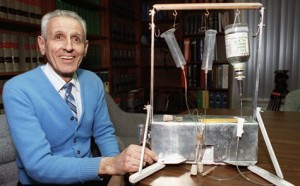When I was studying for my Philosophy degree at Cal State Fullerton the subject of Ethics was often on the agenda. Even in classes that were not related to ethical decision making the subject always seemed to find its way into the discussion. Part of the reason, I suspect, is that we are all confronted with ethical decisions and questions every day. They may be small ones such as whether to stop and help someone with a flat tire or to return the change given to us in error by a young cashier. Unfortunately, sometimes we are confronted with much greater issues of moral and philosophical magnitude. One of the most complex questions we face as individuals and society as a whole surrounds how we die. End of life choices have been a controversial subject for a long time. But the debate has grown exponentially in the last thirty years.
Dr. Jack Kevorkian burst onto the media stage with his crusade for what he termed “Planned Death” or “Prescription Medicide.” Stepping into the fray from theoretical to practical he began actually assisting in the deaths of his “patients” (he was never paid for his services). He performed over 100 assisted suicides with various contraptions he invented. His first patient, Janet Adkins was suffering from Alzheimer’s disease. She was driven to a secluded spot in the back of Kevorkian’s aging Volkswagen bus where she was given control of a lethal injection device which she then used to end her life. Kevorkian was promptly charged with murder but at the time there was no law on the books in Michigan barring assisted suicide. From there he operated at a whirlwind pace that made him an international media sensation.
Ultimately, he was convicted of second degree murder for a taped procedure that aired on 60 Minutes showing him actively euthanizing Thomas Youk, a man suffering from the debilitating effects of ALS also known as Lou Gehrig’s disease. He served eight years of a 10 to 25 year sentence and was paroled in 2007. He never again assisted in a suicide but remained a vociferous and defiant spokesman for his beliefs.
He maintained that the goal for his patients wasn’t death but the alleviation of suffering. His death today at the age of 83 leaves behind a controversial legacy.
Was Dr. Kevorkian the best spokesman for his cause? Perhaps not. Was he an eccentric, a revolutionary or a sociopath? Time and the judgment of history will have to decide. His most important achievement seems to be that he put the topic of how we die and who gets to make decisions for us at the forefront of public debate. Hero to some, villain to others, he raised issues to discuss that in one way or another affect us all. Like much change in our history sometimes it takes the radical or the revolutionary to set the stage for the reformer. Jack Kevorkian certainly seems to have done that.
[the BEST video of this great song, but “embedding-disabled” -http://www.youtube.com/watch?v=cMYSWiPm7E0 – Ed.]

Interesting article! I’ve often wondered if those who have judged him might change their opinion if they were faced with a long, unpleasant and undignified death. Thanks for the great read!
*Dr. Death….or ….our man Jack….whatever…held an idea on euthanasia that has been held for several hundred years that we know of. If a loved one was truly suffering from an endless life of unbearable pain or lost mobility…..who is the one to cast the first stone against the concept of abbrogating that suffering?
Each situation is different and we certainly do not hold an unceremonial agreement to unlimited euthanasia…… but what course would Jesus take?
Well, he went with getting crucified when he allegedly didn’t have to… so, take it from there.
Kevorkian was, in my opinion, a true hero — he gave up 8 years for his core beliefs because of the usual prosecutorial enthusiasm in which the context of the term “murder” means little in the pursuit of a conviction.
I also get tired of the term “Dr. Death” which is demeaning and, actually, kind of stupid. His concerns for ending suffering, and the support of a choice we all should have, despite the opinions of the self righteous nosy little types (usually religious) who think they know much better what’s good for us, were truly magnanimous.
And, like Dr. George Tiller, he did it all with a smart-ass attitude. Because he knew he was right and he was fearless. Me, I like that.